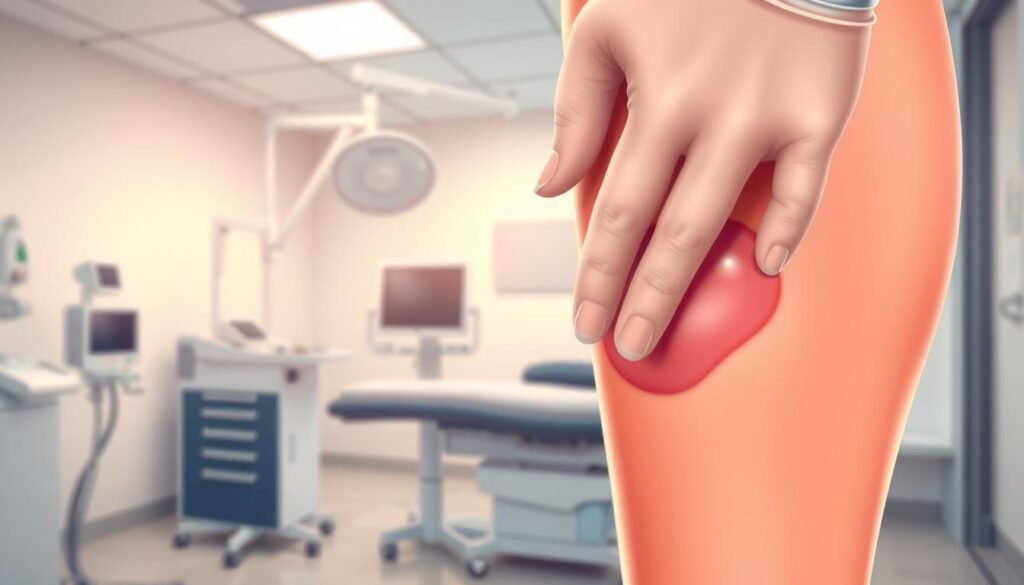Are you experiencing the discomfort and self-consciousness of varicose veins? You’re not alone. Millions of people in the United States suffer from this condition, characterized by enlarged, twisted veins that can be painful and unsightly.
Finding the right doctor is crucial for effective treatment. Several types of medical professionals can address vein disease, but the best choice depends on the severity of your condition and individual needs.
Understanding your options is the first step towards relief. This article will guide you through the process of finding the appropriate care for your vein health, ensuring you receive the best possible treatment from a qualified specialist.
Key Takeaways
- Varicose veins are a common condition that requires proper medical care.
- The right doctor for varicose veins depends on the severity of the condition.
- Several types of doctors can treat varicose veins, including specialists in vein disease.
- Effective treatment options are available for varicose veins.
- Understanding your treatment options is crucial for relief.
Understanding Varicose Veins and Their Causes
Varicose veins are not just a cosmetic issue; they can be a sign of an underlying vascular problem.
What Are Varicose Veins?
Varicose veins are enlarged, twisted veins that typically appear blue or purple and are most commonly found in the legs. They occur due to chronic venous insufficiency, where the valves in the veins fail, allowing blood to pool and causing the veins to dilate.
Common Causes of Varicose Veins
The primary cause of varicose veins is chronic venous insufficiency, a condition where vein valves fail to prevent backward blood flow, leading to increased pressure and eventual vein dilation.
Risk Factors for Developing Varicose Veins
Several factors increase the risk of developing varicose veins, including:
- Genetics and family history
- Age and gender (women are more susceptible)
- Pregnancy and hormonal changes
- Obesity and prolonged standing or sitting
Symptoms That Indicate You Need to See a Doctor
Identifying the warning signs of vein disease is essential for prompt treatment. Early detection can prevent the progression of varicose veins into more serious vascular conditions.
Early Warning Signs of Vein Disease
The early warning signs include leg heaviness, frequent leg cramps, restless leg syndrome, throbbing leg veins, leg swelling, leg pain, and the appearance of spider veins. These symptoms typically worsen at the end of the day or after long periods of sitting or standing still.
| Symptom | Description |
|---|---|
| Leg Heaviness | A feeling of heaviness or tiredness in the legs |
| Leg Cramps | Frequent cramping in the legs, often at night |
| Leg Swelling | Swelling in the legs due to fluid accumulation |
| Spider Veins | Visible, thin veins near the surface of the skin |
When Varicose Veins Become a Medical Concern
Varicose veins require medical attention when they cause persistent pain, severe swelling, skin changes, or bleeding. If you experience any of these symptoms, it’s crucial to consult a doctor.
Complications of Untreated Varicose Veins
Untreated varicose veins can lead to complications such as venous ulcers, superficial thrombophlebitis, and deep vein thrombosis. Early intervention can prevent these serious conditions.
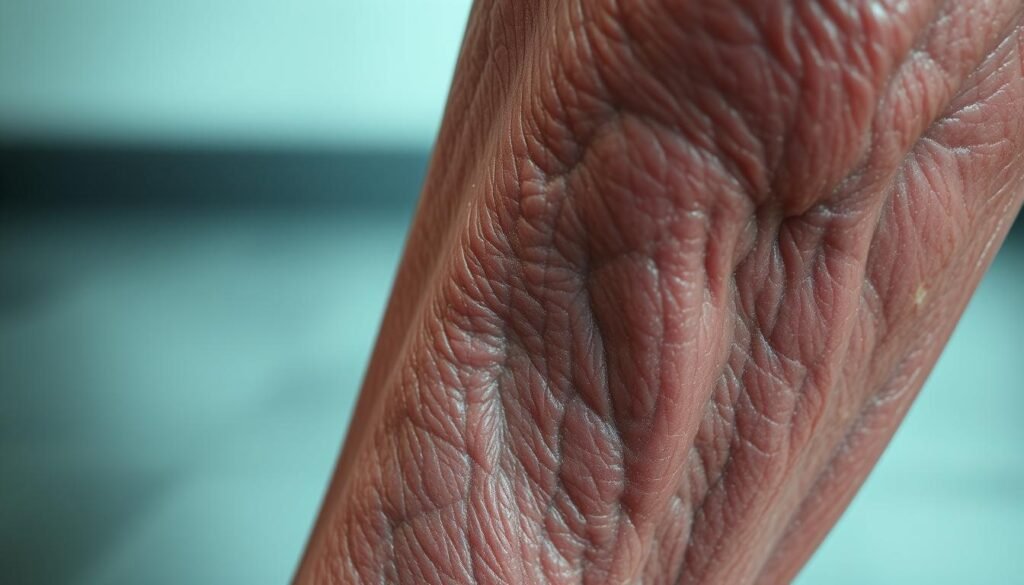
Varicose Veins: Which Doctor Specializes in Treatment?
Varicose veins require specialized treatment, but which doctor should you see? The answer depends on the severity of your condition and the specific treatments needed.
Phlebologists: Vein Specialists
Phlebologists are physicians specifically trained in diagnosing and treating vein disorders, making them the primary specialists for varicose veins. They have in-depth knowledge of vein medicine and are equipped to provide the most effective treatments.
Vascular Surgeons
Vascular surgeons have expertise in all blood vessel conditions and can perform both surgical and minimally invasive vein procedures. They are a good option for more complex cases of varicose veins.
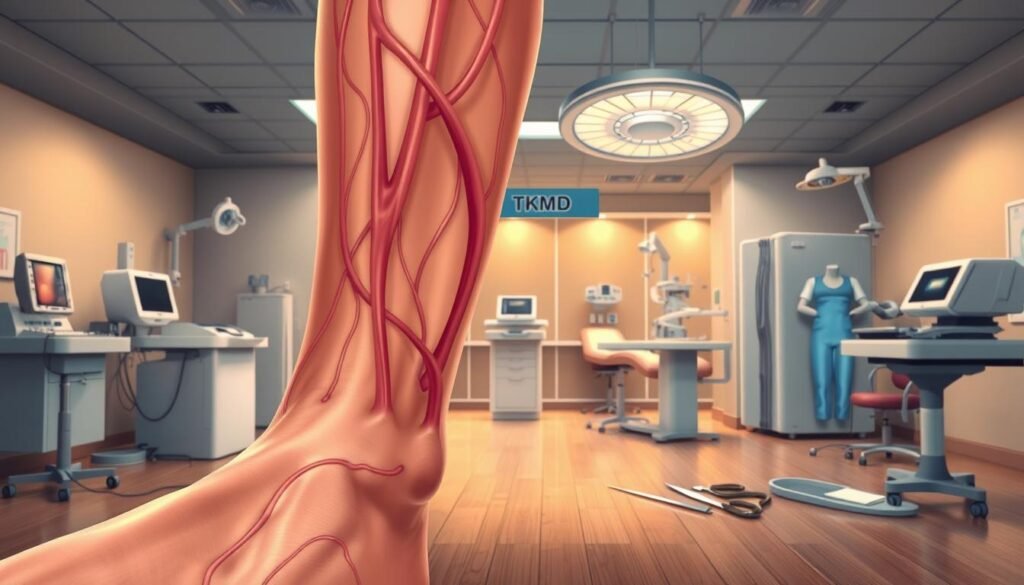
Interventional Radiologists
Interventional radiologists are doctors with additional specialized training in minimally invasive procedures, using imaging guidance to perform vein treatments. They offer a range of treatment options for varicose veins.
Dermatologists
Dermatologists may treat superficial vein issues, but may not address underlying venous insufficiency unless they have additional training in phlebology. They can be a good option for certain types of varicose veins.
Primary Care Physicians
Primary care physicians play a crucial role in initial diagnosis and referral to appropriate specialists. They can help determine the best course of treatment for varicose veins.
In conclusion, the ideal doctor for varicose vein treatment depends on the severity of the condition and the specific treatments needed. By understanding the roles of different medical specialists, you can make an informed decision about your care.
Understanding Medical Credentials for Vein Treatment
To ensure you’re in good hands, understanding the medical credentials of vein specialists is essential. When it comes to vein treatment, the expertise of your doctor can significantly impact the outcome.
Board Certifications to Look For
A key indicator of a doctor’s expertise in vein care is board certification. Look for certifications from reputable organizations such as the American Board of Venous and Lymphatic Medicine (ABVLM) or the American Board of Medical Specialties (ABMS). These certifications signify that the doctor has undergone rigorous training and has passed a comprehensive examination.
Specialized Training in Venous Medicine
Specialized training in venous medicine is another crucial factor. Doctors who have completed fellowship training in this area are equipped with advanced skills in modern vein treatments. This training demonstrates their commitment to staying updated with the latest techniques and best practices in vein care.
Experience and Expertise Considerations
When choosing a vein doctor, consider their experience and expertise. A doctor who regularly performs vein procedures and has experience with various venous conditions is preferable. You can verify a doctor’s credentials through medical board websites and professional organizations, ensuring you’re treated by a qualified specialist in vein medicine.
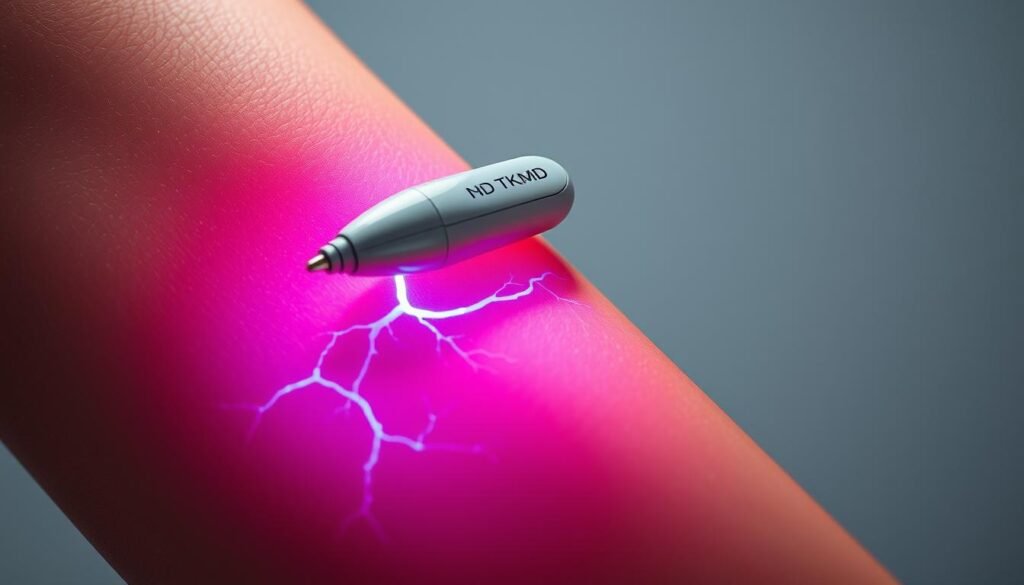
Modern Treatment Options for Varicose Veins
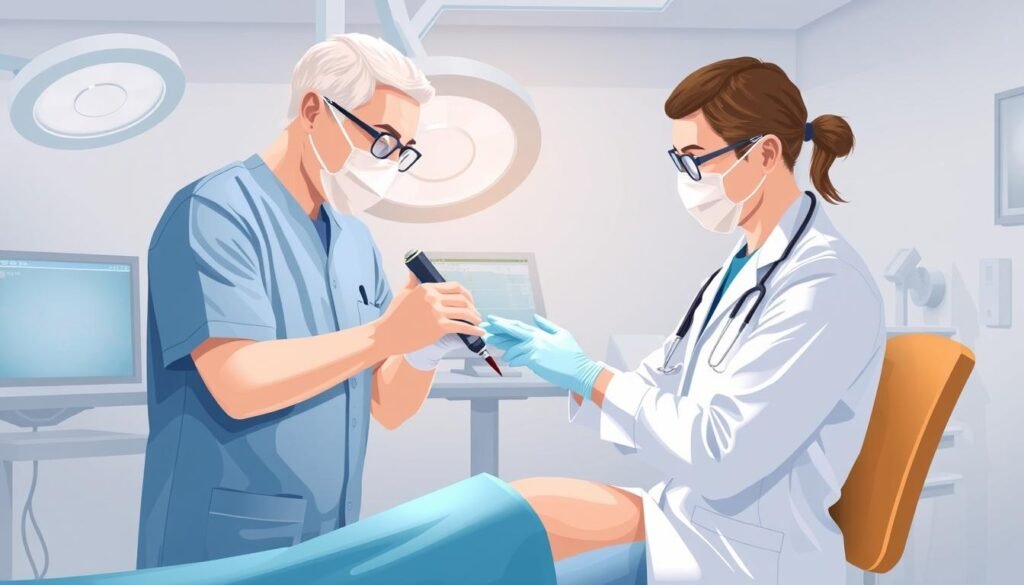
The treatment of varicose veins has undergone a significant transformation with the advent of modern, minimally invasive procedures. These advancements have shifted the focus away from traditional surgical methods, offering patients more effective and safer treatment options with quicker recovery times.
Sclerotherapy
Sclerotherapy is a common treatment approach that involves injecting a solution into the varicose vein to cause it to collapse and eventually fade from view. This procedure is particularly effective for smaller varicose veins and spider veins.
Endovenous Laser Treatment (EVLT)
Endovenous Laser Treatment (EVLT) uses laser energy delivered through a thin fiber to seal off problematic veins. This technique is minimally invasive and has a high success rate in treating varicose veins.
Radiofrequency Ablation
Radiofrequency ablation is another treatment option that uses heat to collapse and seal varicose veins. This procedure is performed under ultrasound guidance, ensuring precise targeting of the diseased vein.
VenaSeal (Vein Adhesive)
VenaSeal is a newer treatment that uses a medical adhesive to close diseased veins. This procedure is quick and requires minimal anesthesia, offering an attractive option for patients seeking to avoid more invasive surgery.
When Surgery Might Be Necessary
While most patients can be effectively treated with minimally invasive procedures, there are cases where traditional vein surgery, such as vein stripping or phlebectomy, might still be necessary. This is typically the case for more severe or complex varicose vein conditions.
Non-Surgical Management Approaches
Managing varicose veins doesn’t always require surgical intervention. Non-surgical approaches can provide relief and help manage symptoms.
Compression Stockings
Medical grade compression stockings are a common non-surgical treatment for varicose veins. They work by applying graduated pressure to improve blood flow and reduce swelling in the legs.
Different compression levels are available, and choosing the right strength depends on the severity of your condition.
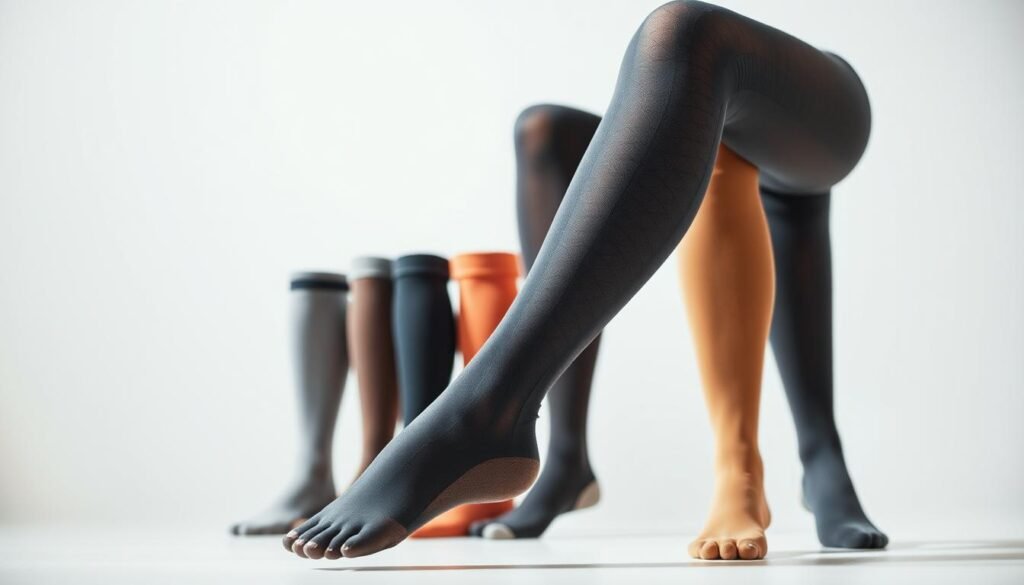
Lifestyle Modifications
Lifestyle changes can significantly impact varicose vein management. Maintaining a healthy weight, avoiding prolonged sitting or standing, and elevating your legs when possible can help alleviate symptoms.
Exercise Recommendations
Regular exercise promotes healthy circulation. Activities like walking, swimming, and cycling are beneficial as they work your calf muscles, improving blood flow.
These non-surgical approaches can help manage varicose veins and slow their progression, but they typically don’t eliminate existing veins. They are often recommended as a first-line treatment or used in conjunction with medical procedures.
How to Choose the Right Vein Specialist
Finding a qualified vein specialist is crucial for effective varicose vein treatment. To start, consider getting a referral from your primary care doctor, as they can recommend a specialist based on your specific needs.
Questions to Ask During Your Consultation
During your consultation, ask questions such as: How many similar procedures has the doctor performed? What results can you expect from the treatment? Inquire about their experience in treating varicose veins.
| Criteria | Importance |
|---|---|
| Board Certification | High |
| Experience in Vein Treatments | High |
| Patient Reviews | Medium |
Reviewing Before and After Results
Reviewing before and after photos of the vein doctor’s previous patients can give you an idea of their expertise and the potential results of your treatment.
Reading Patient Reviews and Testimonials
Reading patient reviews and testimonials can help you gauge satisfaction with both the results and the patient experience. Look for feedback on the doctor’s communication style and approach to treatment.
What to Expect During Your First Appointment
Understanding what to expect during your first appointment can help alleviate concerns and ensure you’re prepared for the diagnosis and treatment of your varicose veins.
Diagnostic Procedures
During your initial consultation, the doctor will start by taking a detailed medical history focused on your vascular health. This will be followed by a physical examination to assess the condition of your veins.
Ultrasound Evaluation
A key diagnostic tool used during the appointment is the Duplex Ultrasound. This non-invasive test allows doctors to assess blood flow, identify valve dysfunction, and diagnose chronic venous insufficiency. With Duplex Ultrasound, doctors can identify defective veins, faulty valves, and varicose vein disease all in a single appointment.
Treatment Planning Process
After completing the diagnostic procedures, the doctor will develop a customized diagnosis treatment plan based on the findings. This plan will outline the recommended treatment options, including:
- Minimally invasive procedures to treat varicose veins
- Lifestyle modifications to manage symptoms
- The use of compression stockings to alleviate discomfort
The doctor will discuss the expected outcomes, recovery time, and potential risks associated with each treatment option. It’s essential to come prepared with questions and information about your symptoms and medical history to ensure the best possible care.
Insurance Coverage and Cost Considerations
When it comes to treating varicose veins, insurance coverage and cost considerations play a significant role. Most patients are advised to take a non-surgical approach, opting for minimally invasive methods that are safer, faster, and more affordable.
When Varicose Vein Treatment Is Medically Necessary
Insurance companies typically cover varicose vein treatment when it is deemed medically necessary. This determination is often based on the severity of symptoms such as pain, swelling, or skin changes.
Questions to Ask Your Insurance Provider
Before undergoing treatment, it’s essential to ask your insurance provider about coverage, pre-authorization requirements, and potential out-of-pocket costs. Patients should inquire about the specific procedures and treatments covered under their plan.
Typical Costs of Different Treatments
| Treatment | Typical Cost Range |
|---|---|
| Sclerotherapy | $300 – $1,000 per session |
| Endovenous Laser Treatment (EVLT) | $1,500 – $3,000 |
| Radiofrequency Ablation | $2,000 – $4,000 |
Understanding the costs associated with different treatments for varicose veins can help patients make informed decisions. While cosmetic treatments are rarely covered, medical necessary treatments often qualify for insurance coverage.
Finding a Qualified Vein Doctor Near You
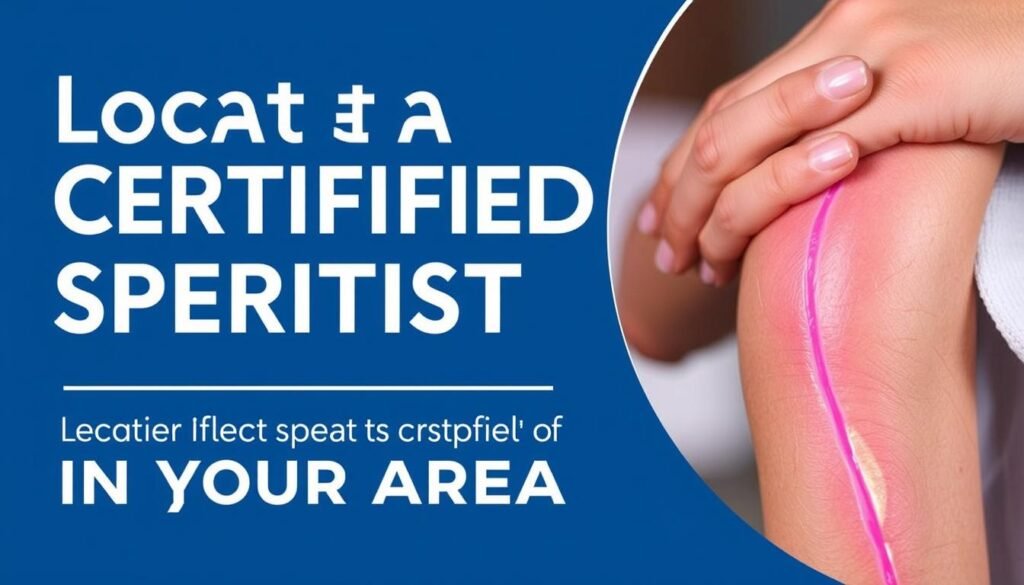
To get the best care for varicose veins, identifying a skilled vein doctor is essential. You can start by utilizing online resources.
Online Resources for Locating Specialists
Professional organizations like the American Vein and Lymphatic Society or American College of Phlebology offer online physician finders. These tools help you locate board-certified vein specialists in your area.
Getting Referrals from Your Primary Care Physician
Referrals from your primary care physician can also be valuable, as they are familiar with your medical history.
Vein Treatment Centers vs. Individual Practitioners
When choosing between vein treatment centers and individual practitioners, consider the benefits of comprehensive care and accreditation, such as certification from the Intersocietal Accreditation Commission (IAC).
Conclusion
Effective treatment of varicose veins starts with consulting the right medical professional. To manage varicose veins effectively, it’s crucial to choose a doctor with specialized training in vein disease. Phlebologists, vascular surgeons, and interventional radiologists are typically the most qualified vein specialists. Modern minimally invasive treatments have largely replaced traditional surgery for most patients. When selecting a specialist, check their credentials, experience, and before/after results. Addressing the underlying chronic venous insufficiency is vital, not just the visible symptoms. With the right medical team and treatment approach, most people can find relief from varicose veins and improve their vascular health.

